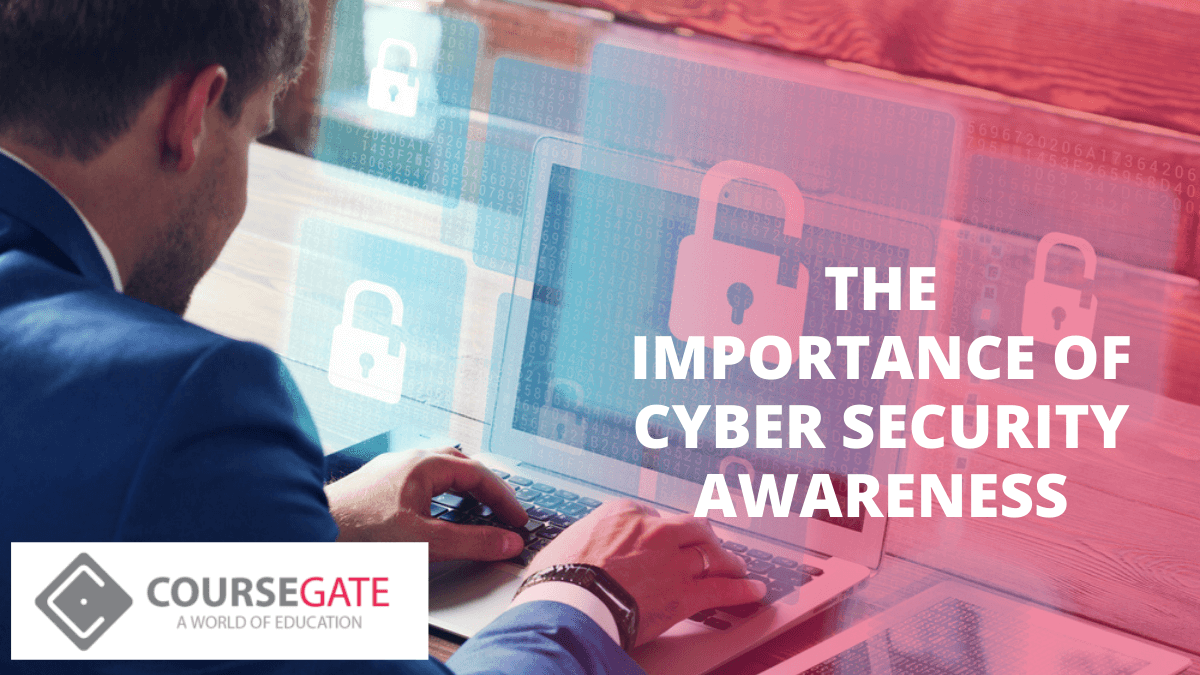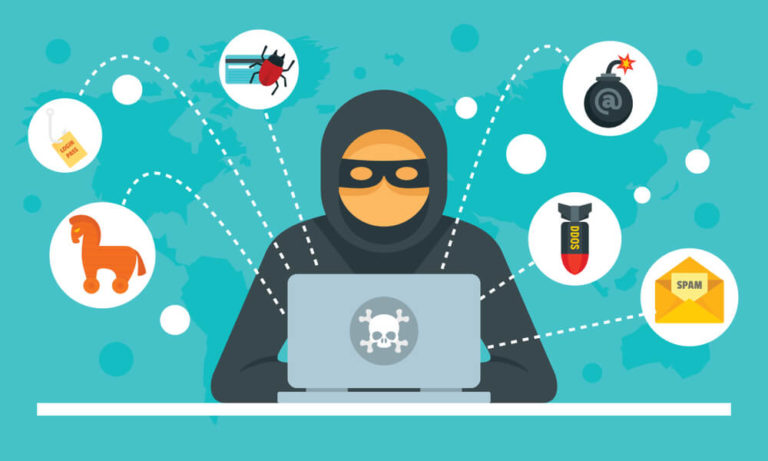

Are your computerised devices safe from cyber-attacks? Or someone has access to your personal information. Cyber security awareness is about knowing the threats and doing something to protect your systems or networks. If you are cyber security aware, you know the potential threats and how to reduce or prevent a cybercrime.
Since we live in a highly connected world by technology, we need to be aware of cyber security. Everything from ordering food to sending people to space, we are doing on computerised devices. Because of the heavy use of internet-based devices, some people are always trying to control them. And they are doing it for their own illicit gain.
Nowadays, every business infrastructure and personal devices are at risk of a cyber-attack. In 2017, cyber-attacks on companies cost the UK economy £10 billion. And seven out of ten companies were the victims of cyber-attacks. That’s why you need to protect your personal or business information from cyber threats.
Thus, you need to protect your personal or business information from cyber threats. Read this blog to know everything about cyber security awareness, including its importance.
Read on.
What is cyber security?
Cyber security is the process of protecting your systems, networks, and programs from cyber-attacks. Nowadays, it is very challenging to implement cyber security measures effectively. One reason behind these attacks is because there are more devices than people. Another reason is that cyber attackers are becoming more innovative day by day.
The purpose of these attacks is to access, alter or destroy valuable information of users. Afterwards, hackers use this information as ransom to extort money from the organisation and users.
Data breaches interrupt companies normal business processes. According to the survey, companies in the UK have to pay an average of £2.9 million for each data breaches. It is also found that human error is responsible for 90% of these cyber-attacks.
Why is cyber security awareness important?
Individual and business owners are greatly benefiting from cyber security awareness programs. A cyber-attack on an individual can result in identity theft, data breaches, and financial losses. Also, it takes only five minutes to hack an internet-connected device.
However, big organisations are the primary targets of cybercriminals because they can get valuable information from just attacking a single company. According to recent research, cyber-attacks have cost the world $2 trillion in 2019. Also, different cyber security ventures estimated in 2017 that damages of cybercrime would reach $6 trillion by 2021. This leads to calls for about $10 billion to be spent globally on cyber-security by 2027 to protect against cyber threats.
There are a lot of benefits of cyber security awareness in business and personal life. Cyber security awareness among users and employee can:
1. Prevent breaches and attacks
Each data breach can cost any company millions. Therefore, if you know all the security threats, you can be safe from breaches in your personal and office devices.
2. Build a security-focused culture
A culture of security in the workplace means the organisation is secured and heading in the right direction. When an employer offers training to their employees on a topic, this indicates that it is crucial. If you can make it a habit, you don’t have to overthink about protecting the data.
However, it isn’t easy to achieve this habit. The only way to build this habit in the workplace by providing awareness training.
3. Make technological defences more robust
Technological defences in systems are a valuable tool in preventing breaches. But these defences require input from people. You can perform specific tasks to make the system more robust. For instance, you have to:
- Turn on the firewalls.
- Acknowledge the security warnings and patch them immediately.
- Update to the latest software.
4. Protect Assets
A security breach is devastating to a company’s reputation, as well as a big blow to their finances. The average cost per breach is $3.62M, according to the IBM Cost of Data Breach report 2017. Thus, it is best to invest in awareness training from the beginning to protect your assets.
5. Give your customers confidence in you
Consumers are very aware of cyber threats. As an employer, you should make them feel safe and secure in your company. A business that takes steps to improve its cyber security can generate better customer trust. Also, customers stay loyal to those businesses that are trusted.
Check Out Youcine Apk
6. Improve employee’s wellbeing
It’s well documented that happy employees mean happy company. If they feel safe at the workplace, productivity will improve significantly. Therefore, by providing cyber security awareness training, you are making them protected against cyber threats. They can use this knowledge in their personal life too.
7. Prevent future attacks
Your method of handling cyber-threat should be proactive and preventive rather than reactive. If you respond to something that happened before, you can find the lacking in your system. From there, you can take the appropriate action to make your system cyber threat proof.
So, it’s safe to say that cyber security awareness is crucial for you and your business. Want to know about cyber security and how to protect your devices. Take a cyber security course with us, CourseGate. You will learn more about specific threats and how to avoid them from this course.
Types of cyber security threats

Hackers have many options or tools when it comes to infiltrating a system. For instance, to compromise a system, cyber-attackers can use:
Malware
Malware is a type of software that performs a malicious task on a target device or network. For example, a hacker uses malware to corrupt data or take over the system.
Phishing
An email-borne attack. Hackers trick the email recipient by clicking on a hyperlink in the message. After clicking the hyperlink, either you downloaded malware or disclosed information.
Spear phishing
It is a more sophisticated form of phishing attacks. The attacker studies the victim and disguises someone he/she knows and trusts.
Man in the middle attack
The attacker intercepts electronic messages in transit and sometimes changes them. Attackers make the sender and recipient believe that they are communicating directly with each other. The military uses this type of attacks to confuse the enemy.
Trojans
Trojan named after the Trojan Horse of ancient Greek history. It is a type of malware that enters a target system looking like a standard piece of software, but they are not. After installing the software, it lets out the malicious code inside the host system.
Ransomware
Attackers encrypt user data on the target system. Then they demand a ransom in exchange for giving the user access to the data again.
Denial of service attack (DDoS)
The attacker takes control of thousands of devices and uses them to freeze a target system’s functions. They crash the system as a result of demand overload.
Data breaches
Data breaches are the theft of vast amounts of data. The purposes of data breaches are to obtain information, defame and espionage.
Malware on mobile apps
Mobile devices are just as vulnerable to malware attacks as other computing hardware. Attackers embed malware in an application, website or phishing emails and text messages. Once compromised, they have access to personal information, location data, financial accounts and more. So, be cautious when installing an application from a third party.
Who are the sources of cyber security threats?

The more we are relying on the internet, the more we need good cyber security for devices. However, cyber attackers come from a variety of places, people and contexts. But first, let’s see who we’re up against.
1. Individuals.
They create their own software tool to attack different organisations or people.
2. Criminal organisations.
These organisations have a large number of employees. Their only goal is to develop new attack methods and execute attacks.
3. Government authorities or foreign government.
They are the sources of most serious attacks. They attack their own country corporate company to collect the user data. Foreign governments attack another government to learn their secret or want to cause disruption vehemently.
4. Hackers.
5. Terrorists.
6. Unhappy insiders.
7. Industrial spies.
8. Organised crime groups.
9. Business competitors.
What are the common cyber-attack targets?

Users of electronic devices are growing faster than ever before due to the modern lifestyle. Also, people are using more than one electronic device.
Individuals, businesses, industries, and governments rely entirely on computer infrastructure for providing services. Nowadays, they are at significant risk due to public access. Also, these service-providing organisations are the primary target of cyber-attacks. Therefore, public service providing organisations are in great danger.
The following are examples of common cyber-attack targets:
Financial systems
Computers sit at the heart of financial regulators and institutions. An institution like the US Securities and Exchange Commission, Australian Stock Exchange, investment banks, and commercial banks can’t run without the help of computerised devices. This is why financial institutions are a favourite target for cybercriminals. Because cybercriminals can easily use their infrastructure to influence markets. And also, earn a lot of money in a short time.
Nowadays, websites and mobile apps are also becoming part of the financial system. When we use online brokerage accounts, food delivery apps, and other apps, they store our credit card information. This sensitive financial information are key targets of cyber-attackers. With this information, they can transfer money, make purchases or sell them on the dark web.
Utilities and industrial equipment
Due to modernisation, our life becomes simple. We can live a luxurious life without working too much by using a computer. Also, we can control everything remotely using smart devices.
A cyber-attack on critical infrastructure such as an electric power plant could cause power loss in extensive areas for a long time. So, you can imagine how much a cyber attacker can harm our life.
However, even devices that are not connected to the internet can be vulnerable to sophisticated cyber-attacks. For example, the computer virus Stuxnet can attack offline devices.
Aviation
Aviation is a critical infrastructure, and it entirely relies on computer systems. A power outage or disruption of in-flight communication can cause cascading effects. Cyber terrorists often use plane insecure Wi-Fi systems to gain control of the system.
Consumer devices and the Internet of Things
Desktop and laptops are primary targets for gathering passwords or financial account information. In addition, people are at significant risk due to the rapid growth in smart and other internet-enabled devices. However, if you are not cautious about the dangers, attackers can take the information.
Nowadays, smartphones collect sensitive information from their users. For example, your location and heart rate. So, be cautious when using these devices.
Corporations
Cyber-attackers target corporations for a variety of reasons, from identity theft to data breaches. However, Individuals do not only do these attacks. Sometimes foreign governments attack corporations to engage in cyber warfare. They spread propaganda, sabotage, or spy on targets by attacking foreign companies.
Automobiles
Nowadays, cars are increasingly computerised with critical systems. Due to modernisation, you can have a certain feature in your automobile. For example, you can:
- cruise control,
- anti-lock brakes,
- door locks,
- engine timing,
- seat belt tensioners,
- airbags remotely.
Every modern car has Wi-Fi and Bluetooth. They are to communicate with onboard devices and cell networks. These onboard systems have increased the risk of cyber-attacks in the automobile. Thus, self-driving cars are even more prone to serious accidents by cyber-attacks.
Governments
Activists and foreign governments attack other government and military systems. The aim of these attacks is to engage in cyber warfare. They gain control of the public system, such as:
- traffic lights,
- personnel records,
- police and intelligence agency communications,
- student records, and
- financial systems.
Medical systems
Hackers attack hospital equipment and implemented devices. For example, they take control of patients’ pacemakers and insulin pumps. The result of these attacks is deadly for the patient.
However, the attackers target medical records for patient identity theft and health insurance fraud. They also use patient’s data to gain prescription drugs for:
- recreational purposes
- resale on the black market.
Emerging cyber threats of 2021
Cyber threats are never static, and it is constantly changing forms. Also, cyber-criminal is creating millions of computer viruses and methods of attacking every year. Most threats follow the standard structure described above. However, they are becoming better and better at executing attacks. Most notorious cyber-criminal doesn’t leave any signature for the authority to find them.
You should watch out for cyber threats:
1. Ransomware attacks.
2. DDoS attacks.
3. Remote and cloud attacks.
4. Phishing.
5. 5G-Enabled swarm attacks on the mobile phone.
6. Social media spoofing for personal information.
If you are wondering how to protect your devices, then read on.
How to protect your devices from cyber threats?
Only you can prevent or reduce the threats by having the knowledge of threats and taking some action. If your sensitive information is compromised, you may have to pay money as ransom. To make yourself aware of the threats, you don’t need money, just your eagerness to know about it. Below are some actions you can take to reduce the threats:
1. Update your software and operating system of the devices.
2. Use anti-virus software to minimise the risk.
3. Do not download applications from unknown sources.
4. Use strong passwords. Use numbers and symbols in the password.
5. Do not open email attachments from unknown senders.
6. Do not click on hyperlinks in emails or texts from unknown senders or unfamiliar websites.
7. Avoid using unsecured Wi-Fi networks in public places.
8. Read about cyber security threats from different sources.
Common sources of cyber security awareness
For more information on cyber security awareness, visit the below links
Conclusion
Cyber security is the process of protecting systems, networks, and programs from cyber-attacks. Thus, if you are aware of it, you can protect your systems or networks from cyber threats.
In this blog, we tried to provide you with enough information about the different aspects of cyber security. So, do you think you have enough knowledge of cyber threats to prevent an attack?
If not, take an online course from CourseGate, to learn more about cyber security awareness. Also, there might be an opportunity for you to get a big discount on this course. So, hurry up!
- All Courses
- IT & Software99
- Microsoft Office64
- Nonprofit & Charity55
- Health & Safety91
- Life Style73
- DIY43
- On Demand Courses42
- Quality Licence Scheme Endorsed113
- Health and Fitness77
- Health and Care162
- Admin42
- Digital Marketing48
- Psychology & Counselling84
- Teaching and Education99
- Design75
- Management129
- Beauty42
- Accounting58
- Employability200
- Human Resource47
- Personal Development131
- Marketing59
- Business153
- Photography38
- Language26













